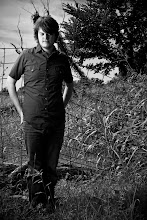Yesterday was a blustery day in Norman, Oklahoma. The wind emphatically shook hands with every limb of every tree in town. It picked up our picnic lunches and tugged on the brims of our hats. It was a wonderful storm, really—all the excitement of a change in the air with none of the soggy inconveniences of rain. The world whirled around in sloppy synchronization like a grandiose improvised modern dance piece. I was enjoying watching the show—even feeling my own cues from the phantom choreographer—but I had almost finished my walk home from school before I really started paying attention to the score.
Through the din of rustling branches and flapping awnings, there emerged a distinct and ephemeral melodic flurry. I would have stopped right there in my tracks and kept listening if I hadn’t been halfway through crossing a busy street. I’m sure people who live in breezier places have heard this little whip of a whistle enough to ignore it when it rings, but for me it was an absolute thrill.
I have my friends and professors to thank for giving me such exceptionally low standards for what constitutes a musical performance. By extension, I owe something to their philosophical forebears, especially John Cage and Pierre Schaeffer. These two thinkers and sometimes-composers were enamored with the sounds of everyday life. Schaeffer wanted to capture these sounds and tinker with them until he heard music. Cage, however, was perfectly content to listen, enjoy, and let the sounds pass with no expectation of a repeat performance.
(As I write, the Saturday Noon Tornado Sirens are going off. I’m going outside to listen…)
Best free concert of the week! This week there was an early undercurrent of a train whistle blowing off to the east, the chatter of birds singing all around, and just as the sirens were winding down, a neighbor to the west of me started up his lawnmower.
I used to try and assemble soundscapes in a computer by layering different recordings of the outdoors on top of one another. But I became increasingly discouraged by the fact that every time I left the recording studio, I thought that what I heard going on around me as I walked home sounded better than what I was whittling away my days trying to perfect.
The last good computer piece I composed before I threw in the towel sounds like this:
I compiled it from recordings of all the little metal objects I had around the house: butter knives, music boxes, car keys, spare change. It’s called “I have become a noisy gong,” and the structure is based on I Corinthians 13. This chapter is often read at weddings so that the bride and groom will be encouraged as they begin a life of loving one another. It is certainly important for marriage to be inaugurated with a reminder of the kindness, patience, longsuffering, and so forth that charity bears out, but what struck me as I began working on this piece was what Paul says in the first verse.
For all my fussiness with words (in speech occasionally, but in writing especially), it is good to remember that loveless eloquence is neither a welcome nor a joyful noise. It is particularly important now that I am beginning to write in this blog for the handful of you patient readers who have followed me here. If I start to ramble and waste your time, if I start to brag or complain or “rejoice in unrighteousness,” stop me in my tracks and I will listen. There’s a comment box just below this paragraph; never be afraid to put it to good use.

I particularly enjoyed the image of wind, emphatically shaking hands with every tree in town.
ReplyDelete